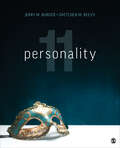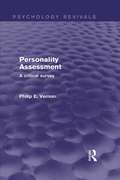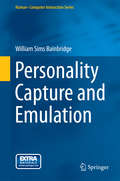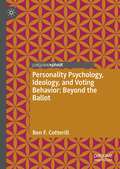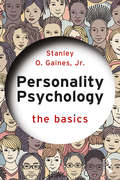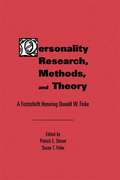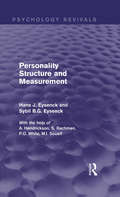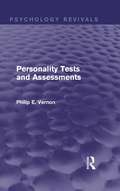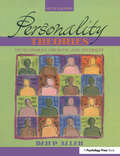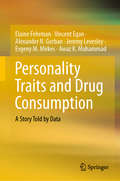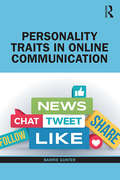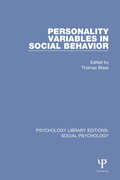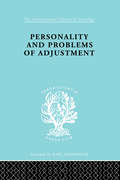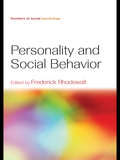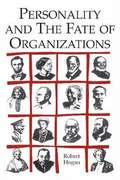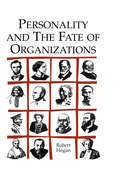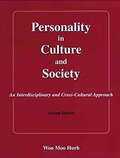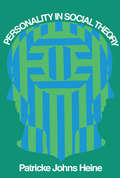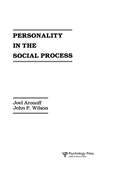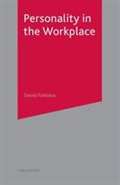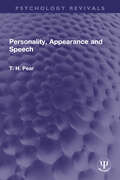- Table View
- List View
Personality
by Jerry M. Burger Gretchen M. ReevyNow published by SAGE! In Personality, the historical underpinnings of core theories and research come alive through biographical and contextual illustrations. Author Jerry M. Burger, and new co-author Gretchen M. Reevy, use vivid stories and discussions to challenge learners to critically consider the discipline’s approach to diversity, research science, and its future as a holistic field of study. With a balance of both theory and research, along with application sections and personality tests, students gain hands-on experience and a comprehensive understanding of the subject matter. Every chapter in this Eleventh Edition has been thoroughly updated, such as sections on Extraversion-Introversion, Dream Interpretation, and Gender Roles, to reflect the most recent research. It also features 400 new references, a new research topic on Narcissism, and two new personality scales. This title is accompanied by a complete teaching and learning package. Contact your SAGE representative to request a demo. Digital Option / Courseware SAGE Vantage is an intuitive digital platform that delivers this text’s content and course materials in a learning experience that offers auto-graded assignments and interactive multimedia tools, all carefully designed to ignite student engagement and drive critical thinking. Built with you and your students in mind, it offers simple course set-up and enables students to better prepare for class. Learn more. LMS Cartridge: Import this title’s instructor resources into your school’s learning management system (LMS) and save time. Don’t use an LMS? You can still access all of the same online resources for this title via the password-protected Instructor Resource Site. Learn more.
Personality Assessment: A critical survey (Psychology Revivals)
by Philip E. VernonOriginally published in 1964, the aim of this book was to analyse the psychological processes involved in understanding personality, and to consider how the psychologist could help in making more accurate assessments. Professor Vernon discusses in detail the scientific status of psychoanalytic and other ‘depth’ theories of motivation, the value of different types of psychotherapeutic treatment and counselling, the influence of upbringing on the development of personality, and the effectiveness of projective techniques. He also examines the reasons for the highly variable results obtained with personality tests and questionnaires. As well as providing a balanced review of theories of personality and of various types of test, this work made a fresh contribution to developing improved techniques of assessment.
Personality Capture and Emulation
by William Sims BainbridgePersonality Capture and Emulation is the gateway to an amazing future that actually may be achieved, enabling the preservation and simulation of human personalities at progressively higher levels of fidelity. This challenge is no longer the province merely of uninhibited visionaries, but has become a solid field of research, drawing upon a wide range of information technologies in human-centered computing and cyber-human systems. Even at modest levels of accomplishment, research in this emerging area requires convergence of cognitive, social, and cultural sciences, in cooperation with information engineering and artificial intelligence, thus stimulating new multidisciplinary perspectives. Therefore this book will inspire many specific research and development projects that will produce their own valuable outcomes, even as the totality of the work moves us closer to a major revolution in human life. Will it ever really be possible to transfer a human personality at death to a technology that permits continued life? Or will people come to see themselves as elements in a larger socio-cultural system, for which a societal information system can provide collective immortality even after the demise of individuals? A large number and variety of pilot studies and programming projects are offered as prototypes for research that innovators in many fields may exploit for the achievement of their own goals. Together, they provide an empirical basis to strengthen the intellectual quality of several current debates at the frontiers of the human and information sciences.
Personality Psychology, Ideology, and Voting Behavior: Beyond the Ballot
by Ben F. CotterillThis book explores how our temperamental proclivities interact with our political leanings, shedding light on why people perceive the world differently. Focusing on the Five Factor Model of personality, currently the most popular framework in psychology research, the text unpacks the literature on the association between political orientations and personality traits. While only part of the puzzle, growing evidence suggests personality traits have a significant impact on our political convictions and voting patterns. In some instances, certain traits may even make individuals more prone to holding authoritarian and prejudicial views. Understanding these dynamics can help people better navigate political differences and conflicts, and will be of interest to students of personality psychology and students of political ideologies.
Personality Psychology: The Basics (The Basics)
by Stanley Gaines Jr.Personality Psychology: The Basics provides a jargon-free and accessible overview of the discipline, focusing on why not all individuals think, feel, speak, or act the same way in the same situation. The book offers a brief history of the area, covering a range of perspectives on personality including psychodynamic, behaviourist, humanistic, and cognitive approaches. Also featuring fascinating case studies to richly illustrate the theories discussed, the text looks at influential theories and related research within each of the major schools of thought in personality psychology. Rigorously examining the fundamental principles of personality psychology, the author concludes by outlining the future of the area in relation to cutting edge research and potential future trends. Exploring the major personality theories that seek to explain why people behave as they do in eight reader-friendly chapters, this is an essential introduction for students who are approaching personality psychology for the first time.
Personality Research, Methods, and Theory: A Festschrift Honoring Donald W. Fiske
by Susan T. Fiske Patrick E. ShroutDonald W. Fiske's professional life and collaborations are themselves a textbook in the development of the field of personality. From the field's early origins in personnel selection, rating accuracy, and psychotherapy outcomes, to its current status of theoretical and methodological maturity -- complete with mid-life crises -- the field has been fundamentally changed by Fiske's work, and the changes have influenced generations of scholars. This festschrift is a celebration of Fiske's impact, but not merely of his impact on the history of personality research. Instead, the volume focuses on ongoing debates and issues that have been framed or influenced by Fiske's work. The festschrift's three sections are organized around three themes in Fiske's writings -- themes that also correspond to three periods in his career. This volume examines current thinking about what can be known about personality, how constructs relevant to personality psychology are best measured, and how to approach specific research problems in personality and related fields. The contributors create an eminent cross-section of the development and current status of personality methods. In addition to Fiske's eminent contemporaries, the contributors to this volume include Fiske's former students, collaborators, and his two children, both of whom are behavioral scientists. The accomplishments of his students, colleagues, and children testifies to the range of psychologists who have benefited from his scholarly and practical wisdom. This collection is a valuable textbook for an advanced graduate course as well as appealing as a scholarly resource. Many of the contributors are renown psychological leaders who have made available their latest original thoughts. The book concludes with an essay by Fiske offering his perspective on the central themes: behavioral and social science metatheory, methods, and strategies.
Personality Structure and Measurement (Psychology Revivals)
by Hans J. Eysenck Sybil B.G. EysenckOriginally published in 1969, this book deals extensively with the description and measurement of personality. Beginning with a statement of the principles of typological research in psychology, set against the background of general taxonomic principles in biology, the study discusses in detail results and generalisations from the Eysencks’ previous work. The second part of the book describes several large-scale studies using personality questionnaires prepared by the authors, as well as the standard ones of Cattell and Guilford. There is a comparative study of the Eysenck, Cattell and Guilford inventories, which analyses the degree to which similar factors can be found in these three instruments and discusses areas of agreement and disagreement between the three authors. The third part deals with personality studies in children, and includes a chapter on personality structure in subnormal subjects. These studies are concerned with discovering the extent to which personality structure changes with increasing age, and to what extent it is possible to measure personality in younger children. They also examine sex differences in personality structure, and show quite marked differences between the sexes on a number of primary personality traits. The results of the Eysencks’ work in this field directed new light on the structure of personality and cast doubt on many widely accepted findings of the time.
Personality Style at Work: The Secret to Working With (Almost) Anyone
by Kate WardMAKE EVERY WORKPLACE INTERACTION POSITIVE AND PRODUCTIVE Named a "Best Career Book 2012" by FINS Finance "Personality Style at Work provides you with the insight and tools to understand your style and to adapt it to others' preferences. Implement the concepts in this book to ensure that you will be a better communicator, team member, and leader. " --ELAINE BIECH, author of The Business of Consulting and editor of The ASTD Leadership Handbook "Kate has done a tremendous job using the Personality Style Model to help us each be the best we can be every day. " --LOU RUSSELL, CEO/Learning Facilitator, Russell Martin & Associates, and author of IT Leadership Alchemy, The Accelerated Learning Fieldbook, Project Management for Trainers, and 10 Steps to Successful Project Management "Personality Style at Work is a fresh and timely approach to the interplay of personality styles in the workplace. You may not need this book if you are a hermit, but it is a must-read for anyone working on a daily basis with other people!" --SHARON BOWMAN, international trainer and author of Training from the Back of the Room "Kate Ward presents a simple, useful model for looking at how personality style affects performance. A great fi nd for anyone interested in improving their everyday interactions. " --GEOFF BELLMAN, consultant and author of Extraordinary Groups: How Ordinary Teams Achieve Amazing Results About the Book: The most important business skill isn't a skill at all. It's your personality. And only when you develop a keen understanding of your personality style--and the styles of the people you deal with--will you reach your full potential as a business professional. Personality Style at Work reveals the proven personality style model used by HRDQ, a trusted developer of training materials--giving you one of today's most valuable tools for leading others, contributing to teams, effectively communicating with coworkers, and making better decisions. This groundbreaking guide helps you achieve positive results in virtually any workplace situation. Whether you're a high-level manager, a salesperson, a customer service professional, or an entry-level employee, you'll learn why others behave as they do in specifi c situations and how to use that knowledge to turn every interpersonal encounter into a win-win scenario. The HRDQ model has been administered to more than one million people--and it has generated remarkable results. It is based on four principal personality styles: Direct: High assertiveness, low expressiveness Spirited: High assertiveness, high expressiveness Considerate: Low assertiveness, high expressiveness Systematic: Low assertiveness, low expressiveness Which one describes you? Knowing the answer is the first step to achieving consistently positive and productive personal interactions--which is why Personality Style at Work includes an assessment that you can take to identify your style. Armed with this valuable self-assessment, you can adapt your behavior to create more practical, harmonious working relationships. Personality Style at Work opens the door to a whole new way of interacting with others in a way that benefits you, your coworkers, your customers, and your entire organization.
Personality Tests and Assessments (Psychology Revivals)
by Philip E. VernonOriginally published in 1953 this book provided the first comprehensive account of methods of personality assessment by a British author. It starts with a short survey of personality theory, pointing out the difficulties in any method of testing or assessment. Next it describes the weaknesses of the common interview method. (Throughout the emphasis is on methods which are usable in educational or vocational guidance and selection, not on methods which are mainly of scientific interest.) Thereafter it takes up each main type of technique – tests based on physique or psychological measures, on expressive movement such as gestures and handwriting, tests of behaviour (including War Office Selection Board ‘house party’ methods), ratings and rating scales, questionnaires, and so-called projective techniques. The evidence for or against each test or method is surveyed and numerous references provided for relevant literature. Illustrative excerpts are given of many of the more promising tests, and some pictorial illustrations. British work in this field at the time is covered completely, and an attempt is made to provide a fair summary of the main contributions of American and other psychologists of the day.
Personality Theories: Development, Growth, and Diversity (Mysearchlab Series 15% Off Ser.)
by Bem P. AllenThis text provides a comprehensive introduction to the key personality theorists by combining biographical information on each theorist with his or her contributions to the field, including her or his ranking among the world’s most respected psychologists. In addition, Allen provides a tabular format–that is, a running comparison between the major theorists, allowing students to analyze new theories against theories learned in previous chapters. The unique style of Allen's book is strengthened through his conversational tone, enabling students to easily grasp an understanding of the key people and movements in the field of personality.
Personality Traits and Drug Consumption: A Story Told by Data (SpringerBriefs in Statistics)
by Alexander N. Gorban Jeremy Levesley Elaine Fehrman Vincent Egan Evgeny M. Mirkes Awaz K. MuhammadThis book discusses the psychological traits associated with drug consumption through the statistical analysis of a new database with information on 1885 respondents and use of 18 drugs. After reviewing published works on the psychological profiles of drug users and describing the data mining and machine learning methods used, it demonstrates that the personality traits (five factor model, impulsivity, and sensation seeking) together with simple demographic data make it possible to predict the risk of consumption of individual drugs with a sensitivity and specificity above 70% for most drugs. It also analyzes the correlations of use of different substances and describes the groups of drugs with correlated use, identifying significant differences in personality profiles for users of different drugs. The book is intended for advanced undergraduates and first-year PhD students, as well as researchers and practitioners. Although no previous knowledge of machine learning, advanced data mining concepts or modern psychology of personality is assumed, familiarity with basic statistics and some experience in the use of probabilities would be helpful. For a more detailed introduction to statistical methods, the book provides recommendations for undergraduate textbooks.
Personality Traits in Online Communication
by Barrie GunterAuthoritative and illuminating, this book demonstrates how we reveal the secrets of our character through the disclosures we make about ourselves in the online world. The author expertly explores whether online information about people, derived from their search patterns, personal detail disclosures and the language they use when posting text, are all related to their personalities. The Internet era has given rise to an enormous explosion of data that is refreshed daily on a massive scale. The growth of online social network sites has created opportunities for more and more people to reveal intimate details about themselves and their lives. While some of these disclosures are consciously made, other, more subtle forms of person profiling can be produced by examining patterns in our online behavior and the language we use in our online posts. As this book will show, techniques have been developed which enable researchers to build detailed personality profiles of people without their awareness, by examining online behaviour and psycholinguistic analysis. Establishing how unlocking the full potential of ‘big data’ is dependent on having the right analytical tools that can be applied speedily and cost-effectively on a massive scale, the author also asks how powerful these methods are, and can they really be used to influence us in the way their critics fear and proponents claim. Explaining how we reveal the secrets of our character through the disclosures we make about ourselves in the online world, this is fascinating reading for students and academics in psychology, linguistics, computer science, and related areas.
Personality Variables in Social Behavior (Psychology Library Editions: Social Psychology)
by Thomas BlassOriginally published in 1977, the aim of this volume was to demonstrate in a concrete way the relevance of some of the most important individual variables for various domains of social behaviour. Eminent researchers at the time contributed original chapters that provided an up-to-date perspective on theory and research on important and widely used personality constructs. This volume should serve as a text for advanced level students seeking a historical introduction to specific personality variables and a survey of theory and research on the most widely used personality dimensions of the time.
Personality and Organizations (Organization and Management Series)
by Benjamin Schneider D. Brent SmithPersonality has always been a predictor of performance. This book of original chapters is designed to fulfill a need for a contemporary treatment of human personality in work organizations. Bringing together top scholars in the field, this book provides a comprehensive study of the role of personality in organizational life. Utilizing a personality perspective, scholars review the role of personality in groups, job satisfaction, leadership, stress, motivation, organizational climate and culture, and vocational interests. In addition, the book looks at more classical topics in personality at work, including the measurement of personality, personality-performance linkages, faking, and person-organization fit. Complete in both conceptual material and reviews of the literature across the variety of domains in which personality plays a role at work, this handbook borrows the idea that personality plays out in many ways in organizations and not just a correlate of task performance. The editors believe that this book supports this belief--that personality in its many conceptualizations is a useful lens through which to shed understanding on the broadest array of contemporary topics in industrial/organizational psychology and organizational behavior. Graduate students and researchers interested in the contributions of personality to almost any topic in which they may have interest will find it valuable.
Personality and Problems of Adjustment (International Library of Sociology)
by Kimbell YoungFirst Published in 1998. Routledge is an imprint of Taylor & Francis, an informa company.
Personality and Psychopathology
by Jennifer L. Tackett Robert F. KruegerTraditionally, personality and psychopathology have been distinct areas of inquiry. This important volume reviews influential research programs that increasingly bridge the gap between the two areas. Presented are compelling perspectives on whether certain personality traits or structures confer risks for mental illness, how temperament interacts with other influences on psychological adaptation, links between personality disorders and mood and anxiety disorders, implications for effective intervention, and more.
Personality and Social Behavior (Frontiers of Social Psychology)
by Frederick RhodewaltThe study of the relationship between the person and the situation has had a long history in psychology. Many theories of personality are set on an interpersonal stage and many social phenomena are played out differently as the cast of characters change. At times the study of persons and situations has been contentious, however, recent interest in process models of personality and social interaction have focused on the ways people navigate, influence, and are influenced by their social worlds. Personality and Social Behavior contains a series of essays on topics where a transactional analysis of the person and situation has proved most fruitful. Contributions span the personality and social psychology spectrum and include such topics as new units in personality; neuroscience perspectives on interpersonal personality; social and interpersonal frameworks for understanding the self and self-esteem; and personality process analyses of romantic relationships, prejudice, health, and leadership. This volume provides essential reading for researchers with an interest in this core topic in social psychology and may also be used as a text on related upper-level courses.
Personality and the Fate of Organizations
by Robert HoganArguing that personality and performance are intricately linked, Hogan offers a systematic account of the nature of personality, showing how to use personality to understand, evaluate, select, deselect, train and understand organizations. He contends that by better understanding other people, readers will be able to pursue their personal, social and organizational goals more efficiently.
Personality and the Fate of Organizations
by Robert HoganPersonality and performance are intricately linked, and personality has proven to have a direct influence on an individual's leadership ability and style, team performance, and overall organizational effectiveness. In Personality and the Fate of Organizations, author Robert Hogan offers a systematic account of the nature of personality, showing how to use personality to understand organizations and to understand, evaluate, select, deselect, and train people. This book brings insights from a leading industrial organizational psychologist who asserts that personality is real, and that it determines the careers of individuals and the fate of organizations. The author’s goal is to increase the reader’s ability to understand other people—how they are alike, how they are different, and why they do what they do. Armed with this understanding, readers will be able to pursue their personal, social, and organizational goals more efficiently. A practical reference, this text is extremely useful for MBA students and for all those studying organizational psychology and leadership.
Personality and the Foundations of Political Behavior
by Jeffery J. MondakPersonality and the Foundations of Political Behavior is the first study in more than 30 years to investigate the broad significance of personality traits for mass political behavior. Drawing on the Big Five personality trait framework, Jeffery J. Mondak argues that attention to personality provides a valuable means to integrate biological and environmental influences in rich, nuanced theories and empirical tests of the antecedents of political behavior. Development of such holistic accounts is critical, Mondak contends, if inquiry is to move beyond simple "blank slate" environmental depictions of political engagement. Analyses examining multiple facets of political information, political attitudes, and participation reveal that the Big Five trait dimensions - openness to experience, conscientiousness, extraversion, agreeableness, and emotional stability - produce both direct and indirect effects on a wide range of political phenomena.
Personality in Culture and Society: An Interdisciplinary and Cross-cultural Approach
by Won M. HurhPersonality in Culture and Society: An Interdisciplinary and Cross-Cultural Approach 2nd Edition
Personality in Social Theory
by Patricke Johns HeineDebate about "self," "person," or "individuality" has come to be recognized as a crisis of modern times. Since it is our fashion to call problems that are either poorly formulated or inadequately resolved by empirical investigation "philosophic," a would-be "science of personality" may be labelled philosophic, though they could as easily be called logical or empirical.
Personality in the Social Process
by J. P. Wilson J. AronoffFirst published in 1985. This book presents a new way to ask an old question. Many fields have considered the nature of the influence that members of a group exert on the course of social events. Social science provides another way to examine this issue. Moreover, social science has a particular strength: It helps us to phrase questions more precisely than before, it encourages us to follow a line of reasoning systematically, and it requires us to evaluate our ideas in light of a particular kind of evidence. The authors want to use these strengths to explore systematically the ways that factors in the person and in the environment together may shape the emergence of social behavior.
Personality in the Workplace
by David FontanaPersonality influences every aspect of our behaviour. Nowhere is this more true than in the workplace. From childhood to retirement, personality helps determine how we relate to others, how we approach our work, the level of our motivation, our ambitions and life goals, and our response to rules and regulations. Effective management, effective teaching, effective leadership all depend crucially upon our understanding of personality in others and in ourselves. Personality in the Workplace covers all aspects of personality assessment, personality development, and personality growth and change in a wide range of working environments, from the classroom to the office. Drawing upon extensive research findings and the author's personal experience as a leading psychologist, it discusses the major psychological theories of personality and goes on to examine how to get the best out of people, how to respond to their individual differences, how to understand the ways in which groups influence their members, how to recognise and respond to anxiety and to other inhibiting factors in people, and how to recognise serious personality problems. With its practical approach and easy jargon-free style, the book will be immediately accessible to students of organisational psychology and education, and will prove of great help to educators, to business people, to professional men and women, and to all those who have responsibility for the performance and wellbeing of others. David Fontana is currently Visiting Professor at the University of Algarve, Portugal, Distinguished Visiting Fellow at Cardiff University and Visiting Professor at Liverpool John Moores University. He is an educational and counselling psychologist with an extensive knowledge of personality in educational and occupational contexts. Among his many books, which together have been translated into 25 languages, are Managing Stress, Managing Time, Social Skills at Work, Psychology for Teachers and Managing Classroom Behaviour.
Personality, Appearance and Speech (Routledge Revivals)
by T. H. PearFirst published in 1957, Personality. Appearance and Speech is an intensive analysis of personality reflected by appearance and speech. It is a most fascinating study of the innumerable outward signs by which the man in the street judges personality. The author considers the effects this has on daily life; for example, can a person’s real character be assessed by a short interview in which personality, counting for so much, can be altered deliberately to no little extent? He describes many investigations which have attempted to discover experimentally the nature and accuracy of personality and character assessments, and includes personality sketches of F. D. Roosevelt, W. E. Gladstone, and of other prominent figures. He discusses the social results of the microphone and the effect on good and bad taste, of opinions widely expressed by listeners and viewers. The nature and function of the intellectuals who have increasing opportunities of affecting appearance and speech, are examined from the psychologist’s standpoint. This book will be of interest to students of psychology, sociology and social behaviour.
